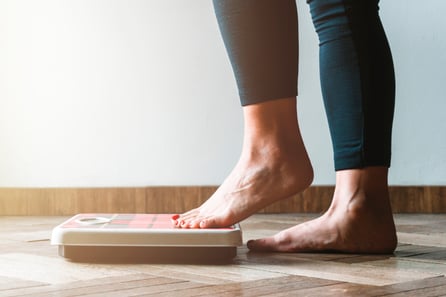 According to the American Psychological Association’s latest Stress in America™ survey conducted in late February 2021, 42% of adults reported undesirable weight gain since the beginning of the pandemic, with an average weight gain of 29 pounds. This shouldn’t come as a surprise to many, since almost everyone was stuck at home, the gyms were closed, and people turned to food for comfort.
According to the American Psychological Association’s latest Stress in America™ survey conducted in late February 2021, 42% of adults reported undesirable weight gain since the beginning of the pandemic, with an average weight gain of 29 pounds. This shouldn’t come as a surprise to many, since almost everyone was stuck at home, the gyms were closed, and people turned to food for comfort.
Six Tips for Losing Pandemic Weight
If you’re struggling to manage your weight following the stress of the COVID-19 pandemic, lockdown, and restrictions, try some of the following suggestions for getting back on track.
1. Establish a healthy eating routine.
Aim to eat three well-rounded meals each day. Meals don’t have to be complicated: the easier and quicker, the better. Try pairing a protein source (such as chicken, salmon, or ground turkey or lean beef) with various grilled, roasted, or steamed vegetables and seasonings and sauces of your choice for a quick, inexpensive, and easy meal.
2. Count calories.
The only tried-and-true method for losing weight is to eat fewer calories than you expend each day. Often when people eat healthy but don’t count calories, they tend to overestimate the number of calories they expend and underestimate the number of calories they eat, leading to weight gain/maintenance and frustration. To determine your individualized caloric needs, speak with a registered dietitian or get an estimate from the USDA’S DRI Calculator for Healthcare Professionals.
3. Stay active.
Fifty-three percent of adults reported that they have been less physically active than they would prefer since the beginning of the COVID-19 pandemic, according to the Stress in America™ survey. Physical activity is a great method for managing weight and stress, and has even been shown to improve sleep. If you don’t feel comfortable going to the gym, take a walk outside. If you’re not able to safely walk outside, create your own walking route inside your home or apartment and take several brief walks throughout the day to keep moving. Try to incorporate at least 30 minutes of physical activity into your routine every day.
4. Limit alcohol consumption.
According to the Stress in America™ survey, 23 percent of adults reported drinking more alcohol during the pandemic as a coping mechanism for stress. The calories in alcohol tend to add up quickly, and too much alcohol can lead to unhealthy habits like overeating. To prevent alcohol-associated weight gain, be sure to drink in moderation, which is defined as no more than two drinks per day for men and one drink per day for women.
5. Manage stress.
There is evidence to suggest that increased cortisol, the hormone released during stress, may result in an increased appetite, leading to overeating and potential weight gain. Instead of turning to food for comfort, be sure to control stress through mindfulness and meditation, exercise, and social support.
6. Get enough sleep.
The Stress in America™ poll also found that 35 percent of adults noted getting less sleep since the start of the pandemic. Sleep plays an important role in losing weight, as inadequate or poor-quality sleep can affect the hormones that control hunger and satiety, may result in less energy for exercise, and could make you more susceptible to making poor food choices. The National Sleep Foundation recommends between 7 and 9 hours of sleep each night for most adults.
Weight-loss Help from NIFS
NIFS can guide you in your weight-loss journey. Our popular Ramp Up to Weight Loss program has been adapted so that you can participate virtually from home or at NIFS.
This blog was written by Lindsey Recker, MS, RD, NIFS Registered Dietitian. To learn more about the NIFS bloggers, click here.

